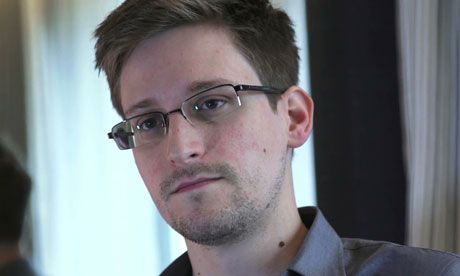 |
| A hero for the modern age |
Edward Snowden’s attempts to ‘
protect basic
liberties for people around the world’ with revelations over the extent to
which apparently liberal democracies are able to spy on their own citizens, the
citizens of other countries, their allies and their trading partners has again
reignited the old debate of security versus privacy and liberty. UK Foreign
Secretary William Hague’s insistence that innocent law abiding citizens ‘
have
nothing to fear’ as only terrorists, spies and criminals will be spied upon
is disingenuous nonsense and simply a flippant dismissal of genuine fears about
the reach of the state into our private lives, how this sits within the law,
how it is supervised and who is accountable. Politicians on both sides of the
political divide, and on both sides of the Atlantic, appear to be showing the
same dismissive attitude as Hague, and remain happy to erode civil liberties
and spy on their citizens and allies with the simple justification of being the
good guys fighting the bad guys (you can choose from a wide range of bad guys,
including: terrorists, criminals, foreign spies, paedophiles, hackers or anyone
else that there is a disproportionate amount of fear of that can be used to
emotionally blackmail the public). If you think that the dismissive reaction of
the UK government is bad, which I do, then the aggressive attitude of the US
administration is even worse. The US government has not stopped for one second
to consider that they are in the wrong and have instead decided to
pursue
Edward Snowden, even to the extent of damaging international relationships,
in order to bring him to ‘justice,’ where justice appears to be being silenced
for exposing tyranny within a liberal democracy. When, as a liberal democracy, you are being lectured about freedom of expression, and over the top intrusion,
by China you might want to rethink your course of action.
 |
| Cyber attack! |
It should come as no surprise that politicians use fear of - insert bad guy here - to justify
actions that have been in no way accountable to the public, or that they use it
to justify further increases in their own power and the power of the
intelligence, defence and police forces for whom they have responsibility and
oversight of as well as power over. This has been a common theme throughout the
‘war on terror’ and has been used to justify rendition flights for torture, the
detention of suspects without charge or trial, erosion of civil liberties,
killing without any due process, invasions of foreign countries and the support
of vicious and oppressive dictators who happen to share our enemies. We are now
seeing the use of the internet – something which was
given
freely to the world 20 years ago that has allowed ordinary people across
the globe so much freedom and power to communicate and organise – as a tool for surveillance and control of
these ordinary people by the very liberal democracies one would hope would be
the biggest defenders of something which encourages freedom of speech and
expression and the exchange of knowledge and experience. Whilst not surprising,
considering the tendencies of the US and the UK to use fear to manipulate their
citizens and to erode civil liberties and privacy, it is shocking, deeply
embarrassing and potentially harmful to international relations, particularly
for the US who are now being slammed by China for
cyber attacks
following so many US accusations being thrown the other way. Of course, it is
not just US politicians who appear to be hypocritical, the UK has our fair
share as well, my favourite example here is the ever reliable Jack Straw and
his seemingly conflicting views on privacy. On the one hand he is
against
intrusion into private life, of course this is where it would appear to
mostly concern public figures, but, on the other hand, is completely in favour
of
more
power for public officials and their security services where it involves
private individuals. This would appear a bizarre contradiction but it is entirely
par for the course where national security is concerned, as politicians now seem
to believe that they are entirely unaccountable for any actions taken ‘in the
interests of national security’ and that they, through privilege of position,
should be allowed greater privacy as public figures than should the public as
private citizens.
 |
Protesters highlighting the
plight of detainees |
Having had a look at the rank hypocrisy on show from our
elected representatives in both the UK and the US, it is perhaps time to
examine the idea that the innocent have nothing to fear from mass surveillance,
breaches of privacy, the erosion of civil liberties and increased power for
politicians, the intelligence services and the police. If these things sound
familiar to you it’s because they are, they are common traits of oppressive,
and often violent, regimes throughout history and across the globe. The argument
that only the bad guys have anything to fear is a surprisingly popular one on
both sides of the Houses of Parliament, and I suspect with both Republicans and
Democrats in the US as well, considering that these people are elected
representatives of the people within liberal democracies, who are currently
perpetuating a ‘war on terror’ which, at its heart, is a war of ideas, as well
as a geo-political one, where each side wants its idea to be dominant.
Apparently, the idea which we are trying to protect is above all one of freedom
and liberty, which is focused on the rights of the individual, democracy,
freedom of expression and freedom from oppression. Somewhat ironically, since
the beginning of ‘the war on terror,’ the protection of this idea has
consistently been used as a justification for the erosion of its principles in
both the UK and the US. Not only have people been detained without charge or
trial in the US, the UK and overseas; been sanctioned without charge or trial;
been flown to less liberal allies for torture; had their freedom of protest
curtailed; been tried in secret courts; and numerous other erosions of our
precious liberties, but US citizens have actually been
killed
in drone strikes authorised by the Obama administration. Now, I am not
suggesting that everyone who has suffered because of these things is innocent
of any crime whatsoever, but, and this is a rather crucial point, the ones of
which I speak have not been convicted of any crime at trial, a central tenet of
our judicial system, and would therefore, without the circumvention of our
normal rules, be considered to be innocent.
 |
| Scary human rights enthusiasts |
Not only does it seem that our liberal democratic principles
are being eroded in such a way as to circumvent what would have been considered
due process for people deemed dangerous by the state, we have also seen
revelations that those who would be considered innocent of any wrong
doing by the vast majority have perhaps been subjected to surveillance by
intelligence and security services. In the UK, for the ‘crimes’ of embarrassing the
police, the intelligence services or the government and holding them to account,
it seems that a number of people and groups have
been
targeted, including the family of murdered teenager
Stephen Lawrence following
public sympathy which followed a botched police investigation. As well as these,
there is also the example of Liberty, a group which campaigns for human rights,
being targeted in the past by MI5 which now fears it has
fallen
victim again. Liberty has a track record of standing up to Western
governments where they show a disregard for human rights, civil liberties and
their own liberal ideals. These are just a few examples in the UK which have surfaced
over the past few days, and there can be
little doubt that the ability of the state to intrude upon our privacy and to put
us under surveillance has increased dramatically since the 90s, when the police
are accused of trying to undermine political and protest groups through
infiltration. That this was also a time before the ‘war on terror,’ and its use as
eternal justification for such blatant disregard of liberty and privacy, is also worth noting, as, through creating an atmosphere of fear, it is now easier to make a claim that something is necessary 'in the interests of national security.'

In the case of the US, you need go no further than two recent and high profile whistleblowers, in Edward Snowden and Bradley Manning, the first of whom has fled the country whilst the other is on trial. In
Snowden's case, in his role working for a defence contractor he came across evidence that the US has been systematically spying on its citizens, citizens of foreign countries and its allies and partners which he then leaked to the Guardian. For this he has been branded a traitor and a defector by Congress and is being hunted by a White House administration which is happy to attempt to bully any country that may be harbouring him.
Bradley Manning's court-martial is currently under way, following the leaking of sensitive material that included
video footage of US forces shooting unarmed men and diplomatic cables which embarrass the US and show its government to be calculatingly hypocritical. As whistleblowers, you would expect them to be protected from the state in a liberal democracy, like the US, when making the public aware of the actions of their representatives and their military, but, unfortunately, they have been deemed traitors for exposing tyranny, hypocrisy, oppression, murder and an over reaching and too powerful state. It is hard to reconcile the idea that we all live in free democracies, free from oppression and with a right to privacy, when those who make public the actions of public officials are routinely prosecuted and shamed, whilst politicians and generals get pensions and position, and groups which disagree with the government are hacked and infiltrated.
With a
well constructed narrative and complex tools at their disposal, as well as the consistent silencing and disparaging of those who seek to expose any wrong doing or hypocrisy, it is hard to understand how anyone can buy into the opinion that the
innocent have nothing to fear from a state already proven to have acted against innocents and run by politicians and institutions in whom public trust is at an
all time low. Throughout history, the innocent have been the
ones to suffer when civil liberties and privacy are eroded and they still have the
most to fear from it now, particularly considering that there are
powers in place for the security services to put suspected criminals and terrorists under surveillance as it is. This begs the question of why there is a desire to access the data of so many citizens? It is not that I am suggesting that the US and UK are now comparable with the worst of history's regimes, but, the more we erode civil liberties, the more we erode privacy and the more we silence those who seek to hold the state to account, the more like a police state we become, and we should not allow this to happen on the justification that we are protecting ourselves from an existential threat that does not exist.




 In the case of the US, you need go no further than two recent and high profile whistleblowers, in Edward Snowden and Bradley Manning, the first of whom has fled the country whilst the other is on trial. In Snowden's case, in his role working for a defence contractor he came across evidence that the US has been systematically spying on its citizens, citizens of foreign countries and its allies and partners which he then leaked to the Guardian. For this he has been branded a traitor and a defector by Congress and is being hunted by a White House administration which is happy to attempt to bully any country that may be harbouring him. Bradley Manning's court-martial is currently under way, following the leaking of sensitive material that included video footage of US forces shooting unarmed men and diplomatic cables which embarrass the US and show its government to be calculatingly hypocritical. As whistleblowers, you would expect them to be protected from the state in a liberal democracy, like the US, when making the public aware of the actions of their representatives and their military, but, unfortunately, they have been deemed traitors for exposing tyranny, hypocrisy, oppression, murder and an over reaching and too powerful state. It is hard to reconcile the idea that we all live in free democracies, free from oppression and with a right to privacy, when those who make public the actions of public officials are routinely prosecuted and shamed, whilst politicians and generals get pensions and position, and groups which disagree with the government are hacked and infiltrated.
In the case of the US, you need go no further than two recent and high profile whistleblowers, in Edward Snowden and Bradley Manning, the first of whom has fled the country whilst the other is on trial. In Snowden's case, in his role working for a defence contractor he came across evidence that the US has been systematically spying on its citizens, citizens of foreign countries and its allies and partners which he then leaked to the Guardian. For this he has been branded a traitor and a defector by Congress and is being hunted by a White House administration which is happy to attempt to bully any country that may be harbouring him. Bradley Manning's court-martial is currently under way, following the leaking of sensitive material that included video footage of US forces shooting unarmed men and diplomatic cables which embarrass the US and show its government to be calculatingly hypocritical. As whistleblowers, you would expect them to be protected from the state in a liberal democracy, like the US, when making the public aware of the actions of their representatives and their military, but, unfortunately, they have been deemed traitors for exposing tyranny, hypocrisy, oppression, murder and an over reaching and too powerful state. It is hard to reconcile the idea that we all live in free democracies, free from oppression and with a right to privacy, when those who make public the actions of public officials are routinely prosecuted and shamed, whilst politicians and generals get pensions and position, and groups which disagree with the government are hacked and infiltrated.
